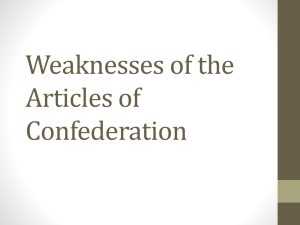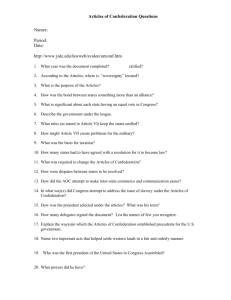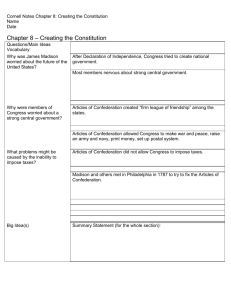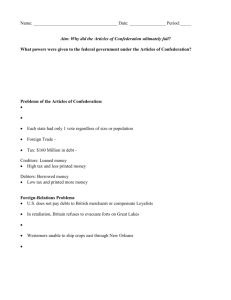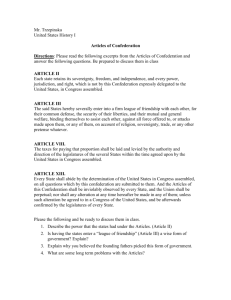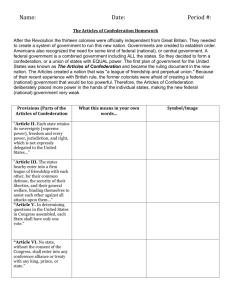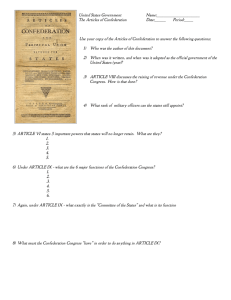Articles of Confederation Worksheet: US History
advertisement
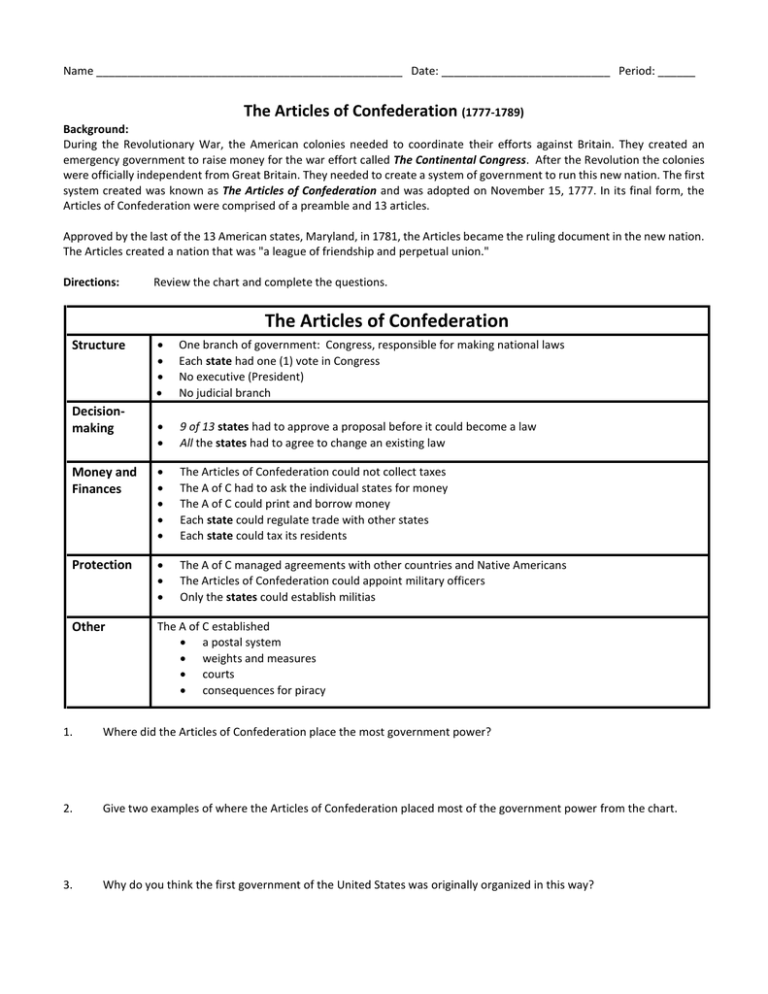
Name _________________________________________________ Date: ___________________________ Period: ______ The Articles of Confederation (1777-1789) Background: During the Revolutionary War, the American colonies needed to coordinate their efforts against Britain. They created an emergency government to raise money for the war effort called The Continental Congress. After the Revolution the colonies were officially independent from Great Britain. They needed to create a system of government to run this new nation. The first system created was known as The Articles of Confederation and was adopted on November 15, 1777. In its final form, the Articles of Confederation were comprised of a preamble and 13 articles. Approved by the last of the 13 American states, Maryland, in 1781, the Articles became the ruling document in the new nation. The Articles created a nation that was "a league of friendship and perpetual union." Directions: Review the chart and complete the questions. The Articles of Confederation One branch of government: Congress, responsible for making national laws Each state had one (1) vote in Congress No executive (President) No judicial branch 9 of 13 states had to approve a proposal before it could become a law All the states had to agree to change an existing law Money and Finances The Articles of Confederation could not collect taxes The A of C had to ask the individual states for money The A of C could print and borrow money Each state could regulate trade with other states Each state could tax its residents Protection The A of C managed agreements with other countries and Native Americans The Articles of Confederation could appoint military officers Only the states could establish militias Other The A of C established a postal system weights and measures courts consequences for piracy Structure Decisionmaking 1. Where did the Articles of Confederation place the most government power? 2. Give two examples of where the Articles of Confederation placed most of the government power from the chart. 3. Why do you think the first government of the United States was originally organized in this way? Part 2 NOTE: The following situations are NOT 100% accurate, though these cases are similar to those that existed after the Revolution, with the Articles of Confederation. Directions: Review each case study with your group. Use the chart of the Articles from today’s class. Explain whether the Articles of Confederation could solve this problem (bullet point notes). 1. Leanne Keene, French ambassador, arrives from Paris to tell you France needs the money it lent the colonies during the Revolution immediately. Can the Articles of Confederation solve this problem? Why/Why not? 2. Neil Thisse is a Loyalist who fled the colonies during the Revolution and has returned to reclaim his property in Dover, MA. According to the Treaty of Paris, he is entitled to his land. However, Massachusetts has passed a law that ignores the claims of former Loyalists. Charles appeals to the Articles for the return of his property. Can the Articles of Confederation solve this problem? Why/Why not? 3. A group of poor farmers in Massachusetts, led by Taylor Coutts and John Sullivan is angered by war debts, bad harvests and high taxes. When their debt-ridden farms are taken by the bank, they march on the state capital in protest. Massachusetts sends their militia to try to stop them and appeals to Congress for assistance. Can the Articles of Confederation solve this problem? Why/Why not? 4. Both New Hampshire and New York desire more territory for settlers within their states. New land would increase trade, profit and power for their individual states. They claim Vermont territory and appeal to the Articles to settle the dispute. Can the Articles of Confederation solve this problem? Why/Why not? 5. Foreign countries do not respect American independence. Although the Treaty of Paris granted the United States all the land east of the Mississippi, Britain refuses to withdraw troops from the Ohio Valley. In addition, Spain closes New Orleans port to American farmers. Can the Articles of Confederation solve this problem? Why/Why not? 6. Some individual states have abolished slavery in their constitutions. Confederation delegates Nevin Weinberg and Dani Kwatcher propose an amendment to abolish slavery in the entire country. Can the Articles of Confederation solve this problem? Why/Why not? Name _________________________________________________ AP Government Articles of Confederation Worksheet The term "articles" means parts or provisions of a document. Answer the following questions using the excerpts of the Articles of Confederation or by using a copy of the full document. The answer can be found in the article listed for each question. 1. Article V a. How many delegates to Congress could each state have? b. How many votes did each state have? 2. Article VIII a. Where would Congress get money to run the country? b. How would this be enforced? 3. Article IX a. What were the powers of Congress that were limited in this excerpt of Article IX? b. What was necessary for Congress to pass a law? 4. Draw a symbol or diagram to represent the Articles of Confederation. Articles of Confederation (excerpts) Article V. ...No state shall be represented in Congress by less than two [members], nor by no more than seven members;... ...In determining questions in the United States, in Congress assembled, each state shall have one vote.... Article VIII. ...All charges of war, and all other expenses that shall be incurred for the common defense or general welfare and allowed by the United States in Congress assembled shall be defrayed out of a common treasury, which shall be supplied by the several states,... ...The taxes for paying that proportion shall be laid and levied by the authority and direction of the legislatures of the several states within the time agreed upon by the United States in Congress assembled.... Article IX. The United States in Congress assembled shall never engage in a war, nor grant letters of marque and reprisal in time of peace, nor enter into any treaties or alliances, nor coin money, nor regulate the value thereof, nor ascertain the sums and expenses necessary for the defense and welfare of the United States, or [of] any of them, nor emit bills, nor borrow money on the credit of the United States,... ...unless nine states assent to the same; nor shall a question on any other point, except for adjourning from day to day, be determined unless by the votes of a majority of the United States in Congress assembled....

